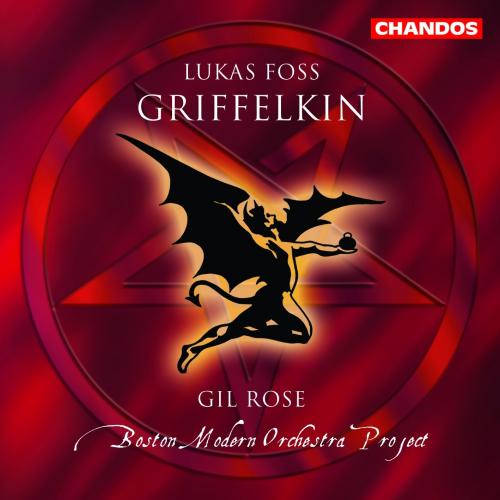
ClassicsToday
Victor Carr Jr.
August 9, 2003
Artistic Quality: 10 Sound Quality: 10
Lukas Foss composed Griffelkin for the NBC television network, which broadcast the opera on November 6, 1955. Although Griffelkin is based on a children’s fable, Foss wanted it to appeal to listeners ages “8 to 80,” so he wrote in a very accessible though not simplistic musical style—and the story has enough of a mature subtext to interest adults as well as children (as all good “children’s” music must).
Griffelkin is the youngest of the devils-in-training under the tutelage of “Grandmother”, who gives him a special surprise for his 10th birthday: he is to be sent to earth for one day to cause as much havoc as he can with his magic dust. This he does with little skill but much determination--mainly performing magic stunts (like animating stone lions). He soon meets a young girl who, impressed by his powers, asks Griffelkin to restore health to her gravely ill mother. When the mother dies, the young devil is so moved by the girl’s and her brother’s grief that he uses the last of his magic dust to resurrect her. Griffelkin is immediately returned to hell, where he is tried and convicted for committing an act of kindness. His punishment: loss of his powers and banishment to the world of humans, where he happily rejoins the little girl and is welcomed into her family.
Harmonically and texturally, Foss’s score owes quite a bit to Stravinsky (especially in its persistent rhythmic impetus), and to a lesser degree Hindemith (yes, it does have tunes!). But the overall structure and style of the opera is recognizably Mozartean. The music begins simply in the opening scene that depicts the young devils’ roll-call, but as the opera progresses it becomes more sophisticated and even dark toward the close of Act 2, where Griffelkin has caused considerable chaos in the Town Square. For Griffelkin’s change of heart scene in Act 3, Foss composes music of a tenderness that becomes quite touching as the little girl and her brother sing of their love for their mother.
Overall the principals offer polished and committed performances, particularly Kendra Colton who convincingly portrays the complex mix of mirth, confusion, frustration, loneliness, and loving kindness that comprises Griffelkin. As the Girl, Misa Ann Iwama’s sweet singing easily steals your heart, while Marion Dry’s grandmother sounds appropriately school-marmish. Of the men, Aaron Engebreth offers a comically authoritative Policeman, while David M. Cushing and Drew Poling sound understandably bemused as the two animated Lions—but I would have liked to hear a lot more snarl and fury in their voices. Conductor Gil Rose leads the Boston Modern Orchestra Project with panache and discernible enthusiasm. Chandos’ clear, immaculately balanced recording presents the score with vibrant impact. Foss was right in his estimation: there’s much to enjoy in this lively and engaging opera—no matter what your age.
-Victor Carr Jr., ClassicsToday.com


